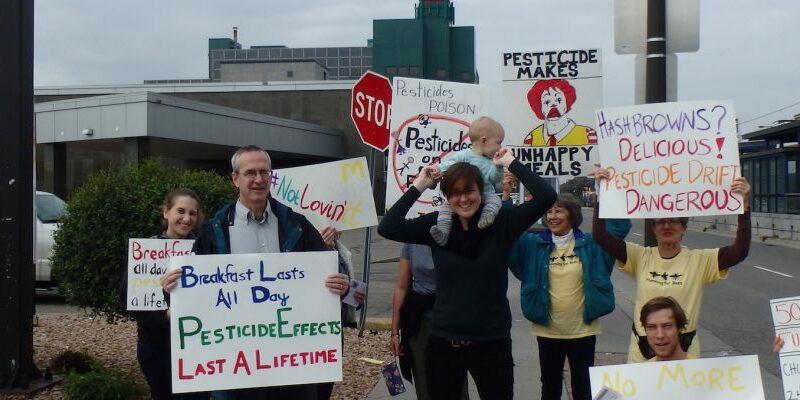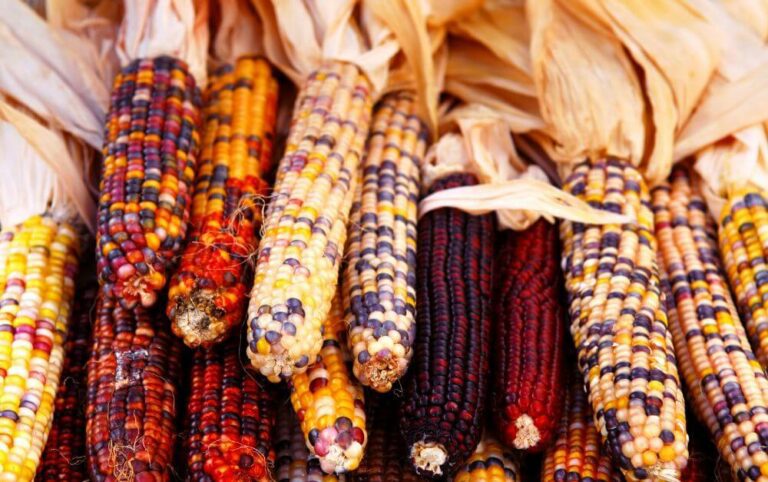On April 1, 2024, Mexico was set to follow through with its 2020 commitment to ban the toxic herbicide glyphosate (the active ingredient in Bayer’s Roundup in the USA and Faena in Mexico) by 2024. When the plan to phase out glyphosate and genetically engineered (GE) corn was originally laid out, Mexico’s government cited the purpose of the new policies as “contributing to food sovereignty and security” and the health of the Mexican people, as well as protecting native corn from contamination by GE pollen. Glyphosate is a pervasive herbicide frequently used on corn and other commodity crops, and genetically engineered corn is often modified to—among other things—be resistant to glyphosate.

News & Analysis
About every five years, the U.S. Congress passes the biggest set of food and farming policies that define the majority of federal farm, food, nutrition, and rural economic programs. At a cost of about $440 billion over five years, these programs influence: What is grown; who grows it; how it is grown or produced; what is done with those products and where they are sold; who can access and afford those goods; and how we invest in rural communities.
By supporting good legislation, opposing bad legislation, and building up a network of supporting organizations, it is our hope that we can collectively move the needle on farmworker rights in the right direction.
Watch and listen as two experienced farmers share stories and practical approaches for small-scale, diversified farms that use the principles of agroecology. This discussion may provide you with ideas that small farms where you live can adapt and thrive.
After many long days of negotiations, the U.N. Environment Programme (UNEP) made a historic move for safer food and farming by passing a resolution on highly hazardous pesticides (HHPs) that calls for action to globally phase out the use of the world’s most toxic pesticides by 2035. Tied with this resolution was the passing of a mandate for UNEP to implement this commitment by forming the Global Alliance on HHPs.
PFAS are persistent and have the potential to affect human health for many years. Some pesticides have PFAS in their formulations and others leach PFAS from their containers.

Kids are being exposed to pesticides in their diet, study confirms
October 9, 2015
For Immediate Release: October 9, 2015 Contact: Paul Towers, 916-216-1082, ptowers@panna.org Oakland, CA — In a study just released in the October issue of Environmental Health Perspectives, researchers found that switching to an organic diet decreased pesticide exposure for children. The study documented urinary breakdown

Toxic Taters meets McDonald’s all-day breakfast with a message: pesticide effects last a lifetime
October 6, 2015
FOR IMMEDIATE RELEASE: October 6, 2015 Contact: Lex Horan, Pesticide Action Network, (651) 245-1733, lex@panna.org Amy Mondloch, Toxic Taters Coalition, (218) 850-3629, tatercoordinator@gmail.com Toxic Taters meets McDonald’s all-day breakfast with a message: pesticide effects last a lifetime Communities near potato fields call on McDonald’s to

16 years later: Pesticides & race in California
October 5, 2015
Sixteen years ago, a group of California parents sued state regulators for failing to protect their children from hazardous pesticides.

Potatoes, pesticides and courage
October 1, 2015
Crop dusters flying overhead, irrigators pumping, and chemical odors in the air. For people who live near RD Offutt’s pesticide-intensive potato fields in Minnesota, these are characteristics of summertime, as much as canoe rides across the lake or picking fresh vegetables from the garden. The

Health professionals join global call for ban of “Highly Hazardous Pesticides”
September 30, 2015
At global chemicals meeting, pressure mounts to support agroecology as alternative to chemical-intensive farming FOR IMMEDIATE RELEASE: October 1, 2015 Press Contact: Linda Wells, linda@panna.org, (563) 940-1242 More than 100 health experts around the world are calling on government leaders to halt production and use








